Turkey’s Erdogan gets sweeping new powers

Ankara — Turkey will be able to extend detention times for suspects and issue decrees without parliamentary approval under a three-month state of emergency approved on Thursday by lawmakers following last week’s attempted military coup.
Parliament voted 346-115 to approve the national state of emergency, which gives sweeping new powers to President Recep Tayyip Erdogan, who had been accused of autocratic conduct even before this week’s crackdown on alleged opponents. Erdogan has said the state of emergency will counter threats to Turkish democracy.
Even without the emergency measures, his government has already imposed a crackdown that has included mass arrests, mass firings and the closure of hundreds of schools. Erdogan said the new powers would allow the government to rid the military of the “virus” of subversion, blaming the coup attempt on a US-based Muslim cleric, Fethullah Gulen. The cleric has denied any knowledge of the attempted coup.
“This is a state of emergency imposed not on the people, but on [the state] itself,” declared Prime Minister Binali Yildirim. “We will, one by one, cleanse the state of [Gulen’s followers] and eliminate those who are trying to harm the country.”
The government hopes the state of emergency will be lifted within 40 to 45 days, said Yildirim’s deputy, Numan Kurtulmus.
Turkey immediately said it was partially suspending the European Convention on Human Rights, allowing it more leeway to deal with individual cases, by invoking an article most recently used by France and Ukraine. The Council of Europe said it had been informed of Turkey’s decision, and that the convention will still apply, but that individual exceptions will be assessed on a case-by-case basis.
Meanwhile, video emerged of soldiers firing at large protests in Turkey during the failed coup. Footage from CCTV cameras above a major bridge in Istanbul showed soldiers shooting at a man who had his hands up as he approached tanks that were blocking traffic. Other footage, obtained from the Turkish Dogan news agency, showed a mob attacking surrendering soldiers over the same bridge after daybreak.
Since the July 15 coup attempt, the government has arrested nearly 10 000 people. More than 58 880 civil service employees – including teachers, university deans and police — have been dismissed, suspended, forced to resign or had their licenses revoked for allegedly being Gulen followers.
Turkish state media said on Thursday that another 32 judges and two military officers had been detained by authorities.
The main opposition Republican People’s Party, or CHP, slammed the state of emergency move.
Speaking ahead of the vote, CHP lawmaker Ozgur Ozel said the decision would amount to a “civilian coup” against Parliament and was a display of “ingratitude” to all the legislators who had gathered in the assembly on Saturday to oppose the coup attempt. Turkish Deputy Prime Minister Mehmet Simsek defended the move, saying he hoped the state of emergency would be short-lived. He said it would be used to go after “rogue” elements within the state and that there would have been “carnage in the streets” had the military coup succeeded.
Simsek said that “standards of the European Court of Human Rights will be upheld”, but didn’t elaborate.
“There will be no curfews. There will be no restriction of movement other than for the suspects,” Simsek said.
Amnesty International said it recognised that the government had to take measures to prevent another coup attempt, but warned that under the state of emergency, dismissed civil servants would not be able to challenge the decrees in administrative courts and detention periods would be extended. — AFP











Comments